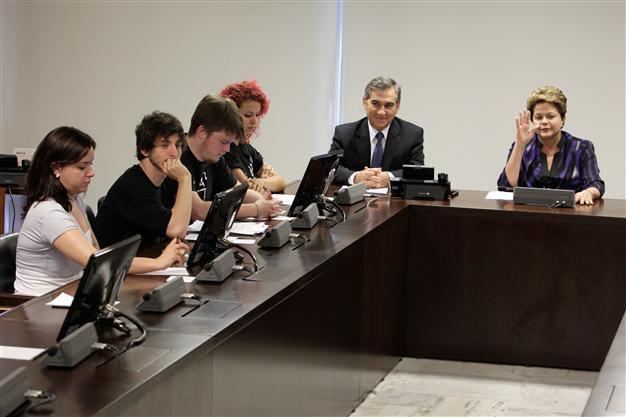Brazil leader seeks support for broad political reform
BRASILIA - Agence France-Presse

Brazil's President Dilma Rousseff, right, accompanied by Gilberto Carvalho, secretary-general of the presidency of Brazil, second right, attend a meeting with representatives of the Free Fare Movement, left. AP Photo
President Dilma Rousseff sought support from lawmakers Tuesday for sweeping reforms in response to a wave of massive protests by Brazilians demanding better public services and cleaner government.Rousseff, a leftist and Brazil's first woman president, proposed a plebiscite on reforms aimed at placating the hundreds of thousands of demonstrators who have taken to the streets in recent weeks to vent their fury at high-level corruption.
"The president is going to send an Executive proposal for a referendum to the House of Deputies and Senate leadership as soon as possible. We do not have time to organize a Constituent Assembly," Education Minister Aloizio Mercadante said referring to her earlier idea which became bogged down over political uncertainties.
Rousseff also offered to earmark $25 billion for public transport, to appease anger over high fares and creaking, overcrowded bus and rail systems.
The dearth in funding had become a political sore spot especially as South America's economic powerhouse -- the world's seventh largest economy -- spends billions to prepare to host World Cup matches and the 2016 Summer Olympics.
The president underscored the need for increased investment in health and education and urged tougher penalties for those found guilty of corruption -- key demands of the protesters -- but her proposals got mixed reactions.
Protests did not disappear, and union leaders announced that the country's largest union federations would protest over inflation and their hopes for better health benefits and a shorter work week, on July 11. They were to be joined by the Landless Farmers Movement (Sin Terra).
Joaquim Barbosa, the president of the Supreme Court, said demonstrators wanted "fast answers" to their demands.
"There is a need in Brazil to include the people in discussions on reforms. Brazil is tired of reforms from the top," he told a press conference after meeting Rousseff.
Barbosa, the first black president of the Court, insisted "ordinary legislation" would not solve the problems.
The Free Pass Movement that spearheaded the protests was seeking free transport for all students; and the demonstrations rapidly grew in size and ambition even after the public transport fare hikes were reversed.
Rousseff's proposals have ramped up pressure on Congress -- the only body that can call a referendum -- where projects to reform politics, combat corruption and boost investment in education have languished.
"The president wavers and acts as if she assumed power today, forgetting that this government has been in office for 10 years," said Senator Aecio Neves, president of the opposition Brazilian Social Democracy Party.
Rousseff followed popular expresident Luiz Lula Inacio da Silva, Brazil's first elected leftist president who could serve only two consecutive terms and was fighting cancer.
Mercadante said two dates were being considered for a referendum: September 7, anniversary of the country's 1822 independence, and November 15, anniversary of the 1889 proclamation of the Republic.
With her proposals, Rousseff sought to regain the political initiative after demonstrations stunned her government, bringing 1.2 million people into the streets last Thursday alone.
On Tuesday, street demonstrations continued on a smaller scale in several areas, including in Belo Horizonte, where Brazil were to face Uruguay Wednesday in a Confederations Cup match.
In various parts of the sprawling Sao Paulo metropolitan area, home to 20 million people, hundreds of people marched peacefully under pelting rain to demand better health and transport and an end to police violence.
In the central city of Cristalina where two women died Monday after being run over by a motorist who forced his way through a blockade, some 300 people staged a protest rally at the scene of the incident, press reports said.
In Rio, nine people, including a police officer, were fatally shot during gun battles that erupted in a slum complex near the international airport.
The deaths were not directly linked to the mass protests rocking the country, but will increase pressure on authorities to improve security in the run-up to next year's football World Cup.
The wave of demonstrations coincides with the Confederations Cup tournament being held in six Brazilian host cities as a dry run for the World Cup. Brazil has spent $15 billion to stage the two events.
















